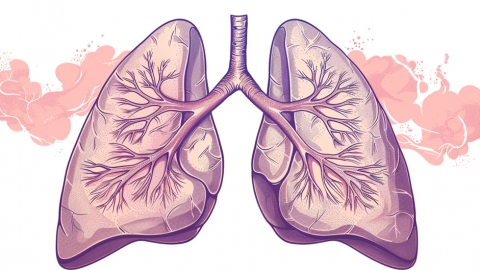What are the causes of pulmonary disease with hemoptysis?
Generally, hemoptysis (coughing up blood) may be caused by overexertion, dry air, pneumonia, bronchiectasis, pulmonary tuberculosis, and other factors. If symptoms occur, it is recommended to seek timely medical treatment at a qualified hospital. Detailed explanations are as follows:
1. Overexertion
Long-term engagement in heavy physical labor or high-intensity exercise can burden the lungs, increasing pressure on the pulmonary blood vessels and potentially causing vessel rupture and hemoptysis. It is important to maintain a reasonable balance between work and rest, avoid excessive fatigue, choose appropriate intensity levels for exercise based on individual conditions, and ensure adequate rest after physical activity to allow full recovery.
2. Dry Air
Remaining in a dry environment for prolonged periods can cause the lung mucosa to become dry and fragile due to lack of moisture, making it prone to damage and bleeding, which may lead to hemoptysis. Using a humidifier indoors can help increase air humidity. Additionally, drinking sufficient water is important to maintain hydration.

3. Pneumonia
Pneumonia is an inflammation of the lungs caused by infection with pathogens such as bacteria or viruses. Inflammation can irritate the lung mucosa, causing congestion and edema. In severe cases, submucosal blood vessels may rupture and bleed, resulting in hemoptysis. Symptoms may also include fever and cough. Under medical guidance, medications such as amoxicillin capsules, cefixime dispersible tablets, and ribavirin tablets may be used to alleviate symptoms.
4. Bronchiectasis
Bronchiectasis causes structural damage to the bronchial walls, leading to chronic suppurative inflammation and fibrosis of the bronchi and surrounding lung tissue, resulting in bronchial deformation and persistent dilation. Dilated bronchi are prone to recurrent infections, and vascular damage may lead to hemoptysis. Symptoms often include chronic cough and expectoration of large amounts of purulent sputum. Under medical supervision, medications such as azithromycin tablets, ambroxol hydrochloride oral solution, and budesonide suspension for inhalation may be used to control infection.
5. Tuberculosis
Pulmonary tuberculosis is an infectious lung disease caused by Mycobacterium tuberculosis infection. It can damage lung tissue and blood vessels, causing hemoptysis, and may also be accompanied by symptoms such as low-grade fever, night sweats, and fatigue. Anti-tuberculosis therapy under medical supervision is recommended, with commonly used drugs including isoniazid tablets, rifampin capsules, and pyrazinamide tablets.
In daily life, it is important to maintain fresh indoor air and avoid exposure to irritating substances such as dust and smoke. Diet-wise, it is recommended to consume light and easily digestible foods rich in protein and vitamins to enhance physical immunity.






